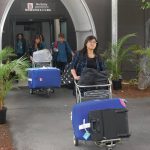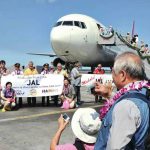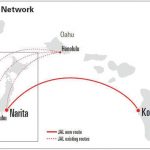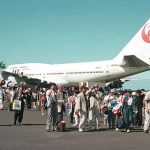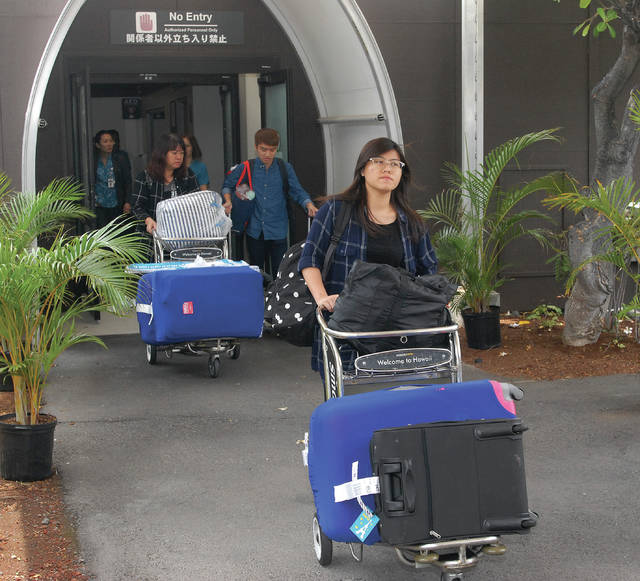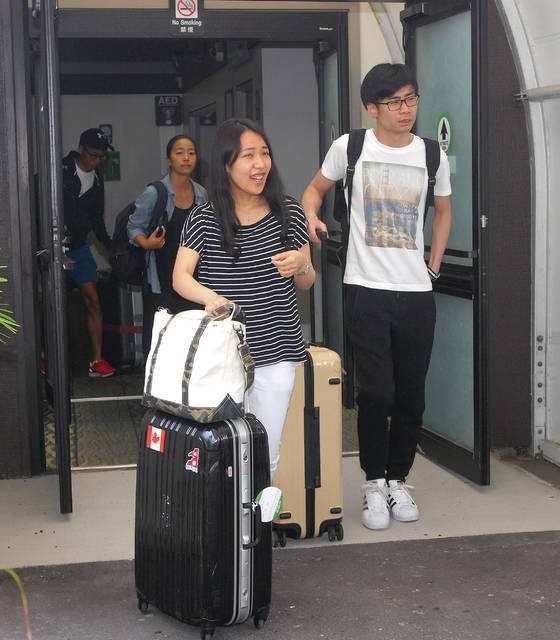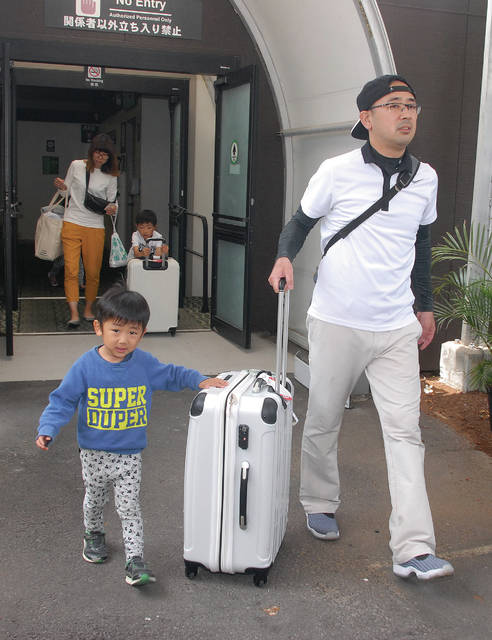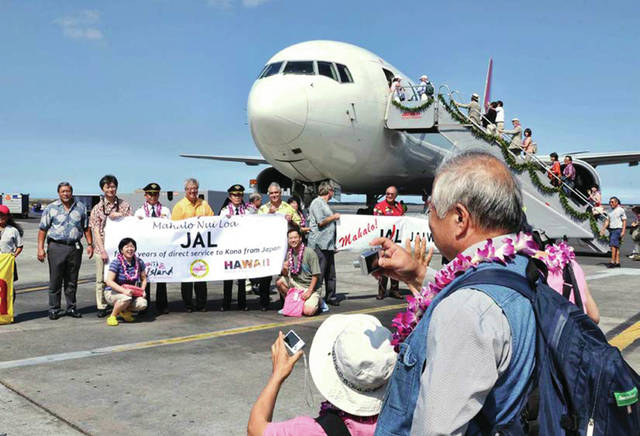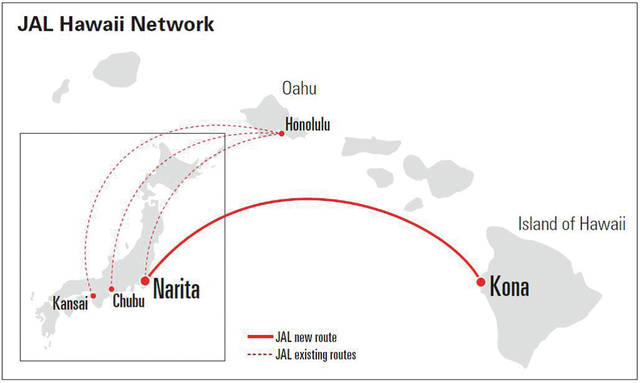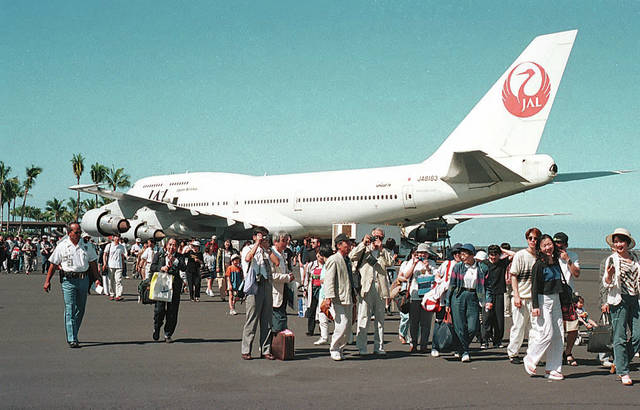KAILUA-KONA — Direct flights from Japan to Ellison Onizuka Kona International Airport at Keahole will be re-established after a seven-year absence. ADVERTISING KAILUA-KONA — Direct flights from Japan to Ellison Onizuka Kona International Airport at Keahole will be re-established after
KAILUA-KONA — Direct flights from Japan to Ellison Onizuka Kona International Airport at Keahole will be re-established after a seven-year absence.
Gov. David Ige was joined by Masaru Onishi, chairman of Japan Airlines, along with other state officials at the Capitol in Honolulu on Wednesday to make the announcement. The new daily flights are set to begin on Sept. 15.
“It is with great pleasure to announce the return of Tokyo service to Kona after a seven-year absence,” Onishi said.
The Tokyo-to-Kona nonstop flights were initially launched in June 1996. However, in 2010 because of a corporate re-organization to downsize flights by 30 percent, Onishi said, the flight was suspended.
“We vowed at the time we would return,” he said.
In December, with the help of U.S. Customs Border Protection, officials announced the
re-establishment of the Kona Federal Inspections Services Facility, said Tim Sakahara, communications director for Hawaii Department of Transportation. This opened doors for international direct flights back into Kona.
“We do know that the (Honolulu) Daniel K. Inouye International Airport is pretty much at max capacity for international travels and reestablishing Kona as a second international port of entry truly helps us statewide with allowing us to receive more international travelers,” Ige said.
The governor said there is ongoing conversation with Customs and Border Patrol to ensure staffing of the inspections facility, but there’s enough with this flight coming in. Concern about keeping it open was that there was not enough traffic to support it.
“We do know that because of Hawaiian (Airlines’) commitment that really allowed us to get the recertification going and now with JAL that really begins to build the critical mass that allows us to re-establish the federal inspection station,” he said.
Ige has spoken with Acting Commissioner Kevin McAleenan of the U.S. Customs and Border Protection, expressing to him how important it is to support additional flights into Kona because of max capacity at Honolulu.
“It’s about really increasing the staffing – as more visitors come into the facility to get them processed and cleared in a timely manner is important,” Ige said.
Chauncey Wong Yuen, Airport Division Hawaii District Manager, said the announcement of the returned flight was welcome news.
Since JAL has operated out of Kona before, Yuen said, they know what to expect.
“We just show great cooperation and great hospitality,” he added. “That will go a long way no matter what we have.”
Ige said Japan Airlines has been providing service to Hawaii for 60 years. The returned service adds to JAL’s six current nonstop flights between Tokyo, Osaka, Nagoya and Honolulu.
“We’re proud of the partnership we have forged,” Ige said. “We are grateful for the mutual benefits that our communities enjoy because of this partnership.”
Ige said this is more than just business, economics or visitor arrivals.
“It’s about reconnecting Hawaii and Japan so that we can strengthen our deep and longstanding relationships,” the governor said. “We are truly more like family.”
JAL’s new service is expected to result in about $84.2 million in visitor expenditures and about $9.8 million in state tax revenue, according to the Hawaii Tourism Authority. The service will also support about 900 jobs on Hawaii Island.
The flights will depart Narita International Airport in Tokyo at 9:25 p.m. and arrive in Kona at 10:15 a.m. Service from Kona will depart at 12:15 p.m. and arrive in Narita at 4:00 p.m. the next day. Schedules are subject to government approval.
As the Kona airport prepares for the resumed service, it is going through growing pains.
In March, the governor and other state dignitaries held a groundbreaking at the airport for a $75 million expansion project.
The project will tear down a building used as the Astronaut Ellison S. Onizuka Space Center for 24 years to make way for the expansion and improvements.
Improvements include one centralized security area, a six-lane passenger screening checkpoint building to expedite the processing of outbound passengers and reduce the time spent in line.
Baggage screening will also undergo improvements as the new inline baggage handling system will employ an Explosive Detection System for baggage screening, which will improve work efficiency for the Transportation Security Administration and airport operations.
Additional features include new restrooms in both the public area before screening and in the terminal areas. The project also includes two covered bag drop areas for added convenience.
The expansion is expected to be complete by February 2019. A permanent customs facility is slated to be finished by 2021.
